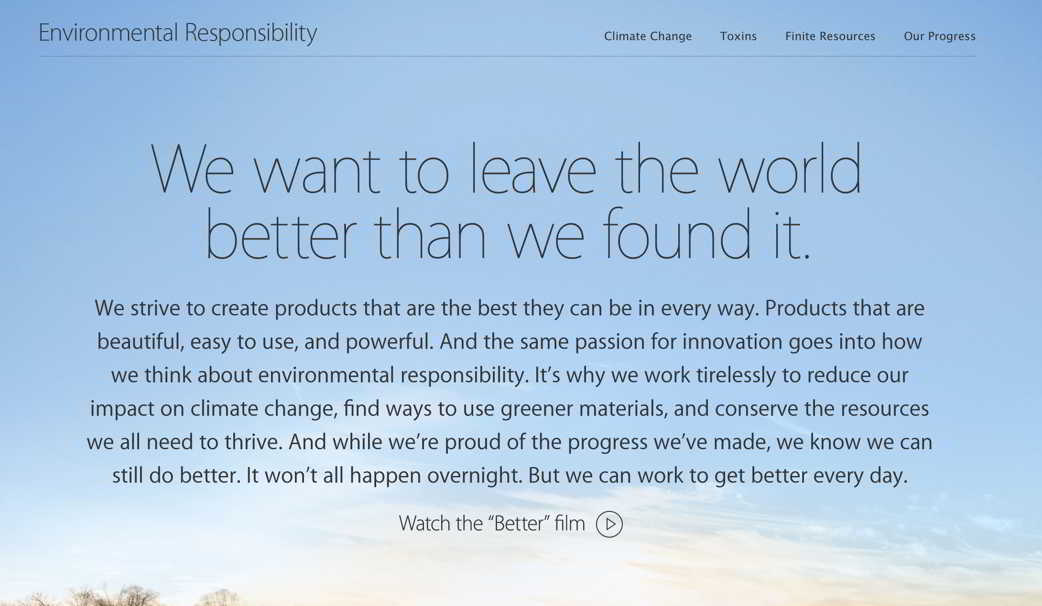Avand o rezerva monetara colosala la dispozitie, compania Apple a decis sa achizitioneze o padure pe care o va proteja impreuna cu o organizatie non-guvernamentala din SUA, cei din Cupertino detinand acum 145685709.068 m² de padure in partea de est a SUA, cei din Cupertino intentionand sa foloseasca padurea pentru a crea hartie dedicata ambalajelor propriilor produse. Cumparand padurea, compania Apple a promis ca defrisarile facute pentru a obtine hartie vor fi sustinute de plantari de copaci noi pentru ca “padurea sa ramana padure”, astfel ca mediul inconjurator nu ar trebui sa fie serios afectat.
Zona impadurita cumparata de catre Apple se afla in doua locatii in Reed Forest in Maine si Brunswick Forest in Carolina de Nord, iar intreaga suprafata este mai mare decat cea a orasului San Francisco, deci Apple va avea suficienta hartie pentru multe milioane de produse vandute in lumea intreaga in urmatorii ani.
The Conservation Fund Partners with Apple To Permanently Protect U.S. Working Forests
Groundbreaking initiative will conserve more than 36,000 acres of vulnerable forestland.Arlington, Va.—The Conservation Fund today announced that it is partnering with Apple to help protect working forests in the United States. The Apple initiative will conserve more than 36,000 acres of working forestland in Maine and North Carolina, ensuring these forests stay forests and any timber on the land is harvested sustainably.
“Apple is clearly leading by example—one that we hope others will follow,” said Larry Selzer, president and CEO of The Conservation Fund. “By all accounts, the loss of America’s working forests is one of our nation’s greatest environmental challenges. The initiative announced today is precedent-setting.”
The forests that Apple and The Conservation Fund are protecting are larger than the land area of the City of San Francisco. Through its commitment, Apple can ensure a steady supply of sustainably harvested timber to paper and pulp mills.
Reed Forest in Aroostook County, Maine:
Apple and The Conservation Fund are protecting more than 32,400 acres on the Mattawamkeag River in Aroostook County, Maine. Reed’s wetlands, rivers and upland forest provide refuge in Maine’s iconic North Woods for Atlantic salmon, bald eagle, northern goshawk and Canada lynx. This project builds on a broader landscape of more than a million acres of conserved lands and interconnected forest habitat that stretches beyond the border into New Brunswick, Canada. Reed Forest will remain a working forest, ensuring continued fiber production and protecting jobs and recreational opportunities.
Brunswick Forest in Brunswick County, North Carolina:
The partnership will protect more than 3,600 acres of pine and hardwood forest in Brunswick County, along the southern coast of North Carolina. This property sits adjacent to the 17,000-acre Green Swamp Preserve, which builds connectivity and halts fragmentation for this National Natural Landmark. With high-quality pine savannas and striking and unusual plants and flowers, it had long been a conservation priority. The Brunswick Forest will be managed by the Fund as a sustainable working forest.
Apple’s initiative protects forestlands through The Conservation Fund’s Working Forest Fund (WFF). Pioneered by the Fund in the late 1990s, the program is an entirely new model for acquiring and permanently protecting ecologically significant portions of America’s last, large, intact privately-held forests. The program places conservation easements on the land, which ensure sustainable harvests and restrict the subdivision or conversion of land to non-forest uses. In addition, this land can only be sold with the conservation easements intact, and sale proceeds are reinvested to protect other vulnerable forestlands.
WFF also uses forest management strategies to enhance forest health and productivity, wildlife habitat, CO2 sequestration and water quality, while supporting the economic vitality of surrounding communities.
Out of 750 million acres of U.S. forests, more than 420 million acres are “working” forest, which provide timber for construction, as well as fiber for paper and packaging. More than 45 million acres of those working forests are at risk of being lost to development. In particular, these lands are being sold and then resold in smaller pieces to be converted into residential and commercial space.
“The status quo for America’s working forests is simply not acceptable,” said Selzer. “We will continue to drive innovative solutions that help ensure their protection and create a sustainable future for generations to come. Today’s announcement is both a turning point and blueprint for forest conservation,” he concluded.




















Titlul m-a omorat zaone….Apple a cumparat o padure….:)))))))))
iForest
@Eugene: Daca asta au facut…
Bravo lor, bine gândit si bine investit. De ar face si ai noștri la fel
Noi o tăiem…
poate apare iphone 7 forest…..:)))
Te cred zaone,era doar titlu care cum l-am vazut m-a bufnit rasul…:))
Padurea e norocoasa,daca ar fi aflat gunoiul de Keresztoy attila de ea ,o facea desert,asa cum a distrus toate padurile din Transilvania
[…] padurilor din China, initiativa alaturandu-se cele anuntate acum cateva saptamani cand am aflat ca Apple a cumparat o padure in SUA pe care intentioneaza sa o […]
[…] renuntand la unii parteneri, folosind materiale noi pentru produse si multe altele. In aceasta idee Apple a cumparat o padure, a anuntat lansarea unor proiecte pentru a produce energie regenerabila in China, 87% dintre toate […]